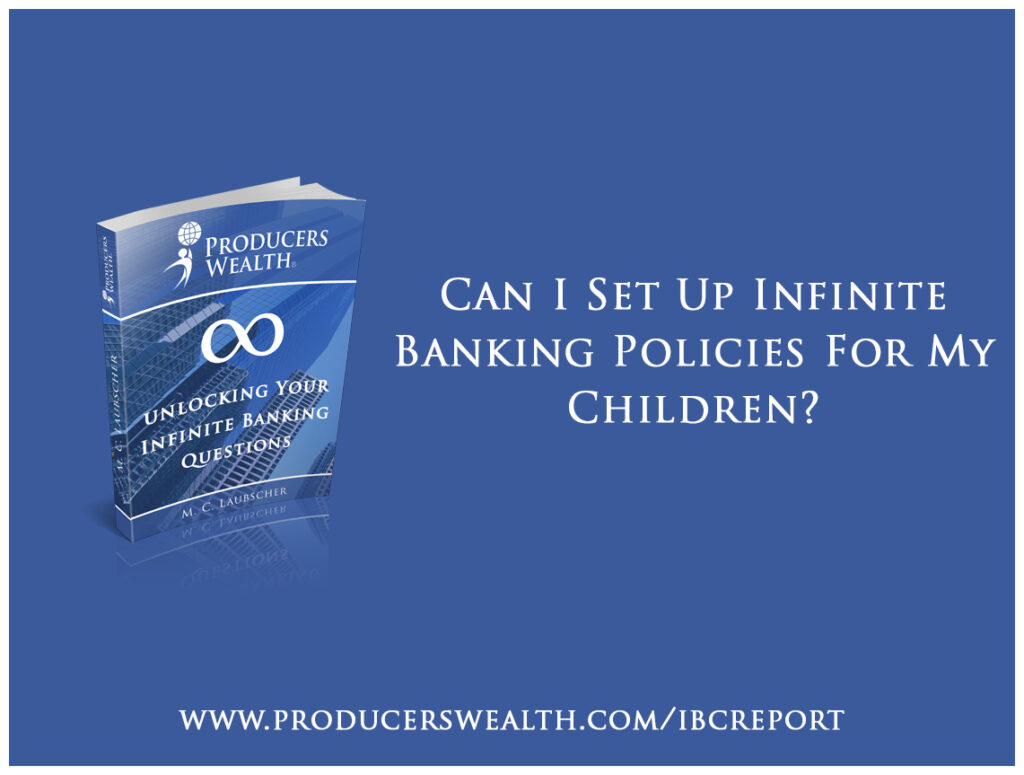
Yes, you can set up Infinite Banking policies for your children using dividend-paying whole life insurance policies.
Establishing a policy for your children can provide numerous benefits, including:
Financial protection: By purchasing a whole life policy for your child, you are ensuring their insurability, regardless of future health changes. This means they will have life insurance coverage throughout their lifetime, providing financial protection for their own family and beneficiaries.
Cash value accumulation: The cash value in a whole life policy will grow over time, providing your child with a source of funds they can access later in life for various purposes, such as college expenses, starting a business, or buying a home.
Tax advantages: As with adult policies, whole life insurance policies for children offer tax advantages, including tax-deferred growth, tax-free withdrawals up to the cost basis, tax-free policy loans, and a tax-free death benefit.
Financial education: Setting up an Infinite Banking policy for your child can be an opportunity to teach them about personal finance, savings, and the importance of long-term planning. This early exposure to financial concepts can help them become more responsible and financially savvy adults.
Legacy planning: By establishing a policy for your child, you can create a financial legacy that will benefit future generations. The policy’s death benefit can be used to provide financial support to your child’s family or to fund a trust or charitable cause.
Is Infinite Banking better than 529 savings plans for educational savings?
Whole life insurance policies and 529 plans are both vehicles for saving for college expenses, but they have different features and advantages.
While 529 plans are designed specifically for education savings, whole life policies can offer additional flexibility and benefits.
Here are some reasons why whole life policies can be considered better for college savings than 529 plans:
Flexibility: Whole life policies provide greater flexibility in terms of how the funds can be used. With a 529 plan, the funds must be used for qualified education expenses, or they may be subject to taxes and penalties. In contrast, the cash value in a whole life policy can be accessed for any purpose, including non-education-related expenses.
Tax advantages: Both 529 plans and whole life policies offer tax-deferred growth, but whole life policies have additional tax benefits, such as tax-free policy loans and tax-free withdrawals up to the policy’s cost basis. Additionally, whole life insurance policies provide a tax-free death benefit to beneficiaries.
Financial aid considerations: Money in a 529 plan may be considered an asset when calculating financial aid eligibility, which could potentially reduce the amount of financial aid a student receives. In contrast, the cash value in a whole life policy is typically not considered an asset for financial aid purposes, which may result in more favorable financial aid packages.
Protection from market fluctuations: The cash value in a whole life policy grows at a guaranteed minimum interest rate and may also earn dividends, providing more stable and predictable growth compared to investments in a 529 plan, which are often subject to market fluctuations.
Lifetime coverage: A whole life policy not only provides a source of funds for college expenses but also offers lifetime insurance coverage, ensuring the policyholder’s insurability and providing financial protection for their loved ones.
No contribution limits: Whole life policies do not have annual contribution limits, whereas 529 plans have limits based on the plan’s total balance. This allows for more significant cash value accumulation in a whole life policy if desired.
Watch all of our educational videos on Infinite Banking here.
Disclaimer and Waiver
Michiel Laubscher & Laubscher Wealth Management LLC is not an investment advisor and is not licensed to sell securities. None of the information provided is intended as investment, tax, accounting, or legal advice, as an offer or solicitation of an offer to buy or sell, or as an endorsement, of any company, security, fund, or other offerings. The information should not be relied upon for purposes of transacting securities or other investments. Your use of the information contained herein is at your own risk. The content is provided ‘as is’ and without warranties, either expressed or implied. Michiel Laubscher & Laubscher Wealth Management LLC does not promise or guarantee any income or specific result from using the information contained herein and is not liable for any loss or damage caused by your reliance on the information contained herein. Always seek the advice of professionals, as appropriate, regarding the evaluation of any specific information, opinion, or other content.





